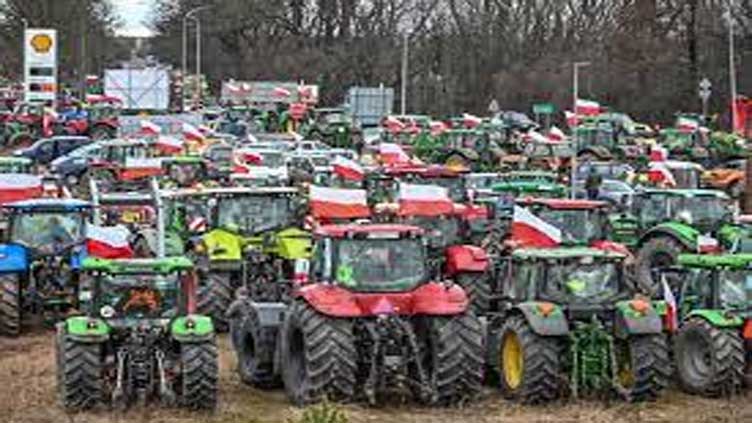Polish farmers clash with police outside parliament in Warsaw

World
Polish farmers clash with police outside parliament in Warsaw
WARSAW (Reuters) - Protesting farmers clashed with police outside the parliament building in Warsaw on Wednesday, with police using pepper spray and accusing some participants of violence against security forces.
Thousands of farmers had gathered in the Polish capital, burning tyres and throwing firecrackers as they demanded a halt to cheap imports and environmental regulations they say harm their livelihoods.
"Due to physical aggression against police officers by some of the people protesting ... it was necessary to use direct coercive measures," Warsaw police wrote in a post on X.
"Behaviour that threatens the safety of our officers, including throwing cobblestones at them, cannot be taken lightly and requires a firm and decisive response."
They added that several officers were wounded and around a dozen people were detained.
A Reuters witness saw police pepper spraying a demonstrator holding a Polish flag and another hurling an object at police shortly after.
Local media footage showed several protesters forcing their way onto parliamentary grounds before being subdued by police.
Earlier on Wednesday some of the protesters carried and then burned a coffin bearing a sign that read "farmer, lived 20 years, killed by the Green Deal" as they thronged the street in front of the prime minister's office, blowing horns and holding Polish flags aloft before marching on parliament.
Television footage showed tractors on the outskirts of Warsaw being stopped from entering the city and farmers blocking roads elsewhere in the country.
Farmers across the European Union have been calling for changes to restrictions placed on them by the bloc's Green Deal plan to tackle climate change, and for customs duties on imports of agricultural products from Ukraine that were waived after Russia's invasion to be reimposed.
In Poland, this has created a delicate balancing act for Donald Tusk's government in a year where it faces both local and European elections, as it seeks to address farmers' concerns while also maintaining its staunch support for Kyiv.
The farmers, who were making good on their promise to return to Warsaw after thousands of them marched through the city a week earlier, have been backed by Poland's biggest labour union NSZZ Solidarnosc, as well as hunters and forestry workers.
Tusk has said that market disruptions were not only caused by agricultural products from Ukraine but also those from Russia and its ally Belarus.
On Monday, he said Poland planned to ask the European Union to ban imports of agricultural products from Russia and Belarus.
The prime minister has invited farmers leaders for talks on Saturday.


